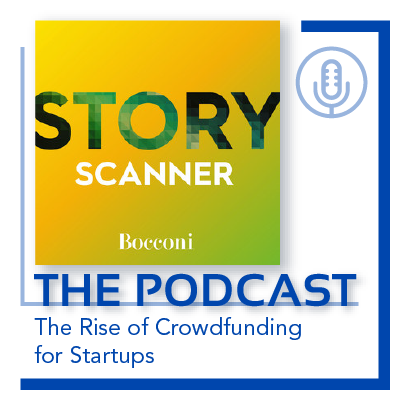
The Entrepreneurial Storytellers
Crowdfunding has transformed the landscape for entrepreneurial funding – offering new ways to raise money through digital platforms. Crowdfunding platforms have also been a boon to entrepreneurship research because they are like a "petri dish" for early stage entrepreneurship, where we can observe individuals and teams creating, pitching, and carrying out entrepreneurial projects in ways that were previously invisible.
Research has explored a variety of factors that influence the success or failure of projects in crowdfunding. Most of the studies have explored success in rewards-based crowdfunding, which was more prevalent than equity crowdfunding until recently. Studies have found a number of characteristics of project creators – such as their prior experience, their professional background, and their social networks – that increase the success of fundraising. In addition, some aspects of the project itself – the extent of prior development and how well targeted the project is to the community – can also increase success in fundraising. But now research is turning to the nature of the story that project creators tell to engage their audience.



There is a central challenge, however, for entrepreneurial storytelling: founders are trying to tell a story when the end is still to be written – we can't know for sure how this venture will turn out. Thus they cannot offer a complete narrative arc, from a beginning, through a central struggle, to a satisfying resolution. Instead we understand entrepreneurs as offering narrative fragments, building blocks of stories, which audiences may put together in ways they find most understandable.
My recent research, with Professor Chiara Spina of Insead (a recent Bocconi graduate), tries to understand whether online pitches should include aspects of entrepreneurial process as one element of the narrative that they share. We study stories based on two tools that entrepreneurs use in the process of building new businesses – planning and experimentation – to see if discussing these in pitches will strengthen the case to funders. These tools are two fundamental but very different approaches to new ventures: planning minimizes uncertainty by identifying intermediate steps and laying out a timetable, while experimentation focuses on the inherent uncertainty and uses rapid learning by doing to explore it.
We find that when project creators share their use of these tools in describing their project, they are more likely to succeed in raising funds from the crowd. In general, discussing experimentation is more associated with success, since the likelihood of receiving funds is six percent higher for projects that discuss experimentation, while it is four percent higher for those that discuss planning. However, these narrative elements interact very differently with the prior experience of the entrepreneur. Experimentation narratives are by far most successful in cases where it is the first time on the platform for the entrepreneur, but the relationship goes away – or even turns negative – when they are returning after multiple projects. Planning, on the other hand, retains its positive association and even strengthens as entrepreneurs gain more experience. While we find these patterns through observing tens of thousands of real world projects on a popular crowdfunding platform, it can be difficult to conclude decisively that this is a truly causal relationship. But we have gone on to replicate this pattern in online experiments in which we recreate the experience of reading and bidding on a project. So we are reasonably confident that these narrative approaches are really leading to the different outcomes.
We draw two important conclusions from these findings. The first is that entrepreneurial storytellers can improve their connection with the audience and strengthen their claims if they share elements of the process, or "work in progress," of developing a new venture. Sharing aspects of the venture creation process can, in fact, connect with the audience rather than turn them off. Perhaps more importantly, though, the types of stories that entrepreneurs tell need to be consistent with their identities. If you are a newcomer, then discussing experimentation can help overcome the lack of expertise that audiences are likely to see in you. However, if you are a more experienced entrepreneur, then highlighting the remaining uncertainty in a venture by discussing experimentation may actually undermine the ways in which the audience sees you as expert or knowledgeable. In a broader sense, entrepreneurs need to keep in mind that the stories they tell will resonate with audiences only when they fit with the foundational identities that they are communicating.